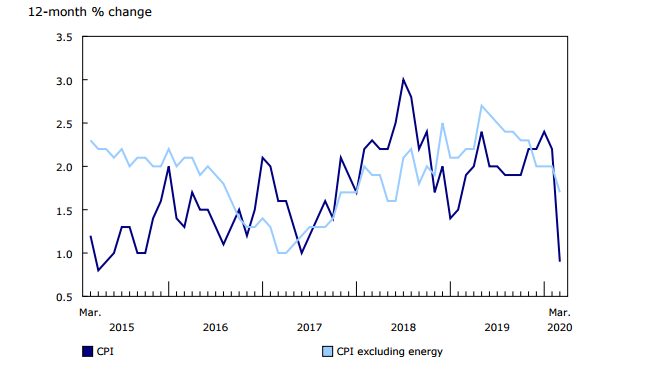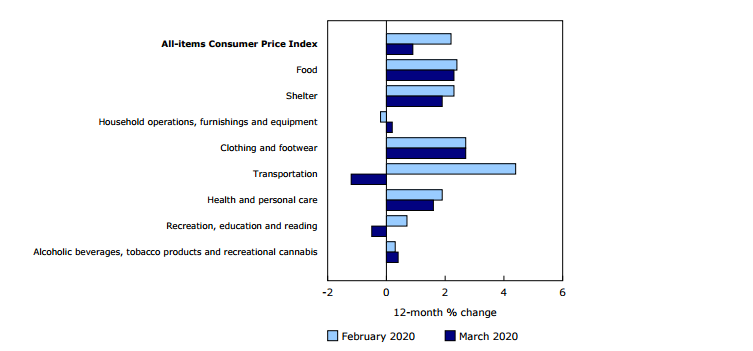Statistics Canada reported that the Consumer Price Index (CPI) increased 0.9% in March, compared to this time last year. The agency also stated that due to the decrease in global economic activity from the COVID-19 pandemic, consumer growth has not slowed to such an extent since September 2006. According to Stats Can, excluding energy, the CPI increased 1.7%.
Six of the eight major indexes saw increases with the shelter prices (1.9%) seeing the largest increase on a year-over-year basis. Conversely, since March of last year, prices decreased for transportation (1.2%) and recreation, education and reading (0.5%).
Over a 12-month span, energy prices plummeted 11.6% in March, which was due to the largest single month decrease since November 2008. Stats Can reported that compared to March 2019, gas prices had dropped a whopping 21.2%. The agency also said that because of low crude oil prices, there was a decrease in fuel oil and other fuels (9.5%) and fuel, parts and accessories for recreational vehicles (18.5%), on a year-over-year basis.
In March, service prices decreased to 2.0% on a year-over-year basis what for the repercussions of the COVID-19 pandemic. Stats Can indicated that services were affected by travel restrictions and suspended flights in an attempt to curtail the Coronavirus outbreak.
Regarding the global COVID-19 pandemic, Statistics Canada released a statement indicating that it was keeping abreast of this unprecedented situation.
“Statistics Canada continues to closely monitor the impacts of the novel coronavirus (also known as COVID-19) on Canada’s Consumer Price Index (CPI).
Price collection for the March CPI was largely unaffected by the COVID-19 pandemic, as the majority of prices were collected prior to the implementation of local travel limitations. Statistics Canada has, where necessary, adopted measures to reflect the limitations faced by Canadian consumers.
In March, several international flights were suspended indefinitely in an effort to limit the spread of COVID-19. Although information on airfares was collected prior to the suspension of flights, these flights are excluded from the March CPI calculation because passengers were ultimately unable to consume these services.
As with airfares, prices for travel tours were collected in advance of the advisories against non-essential travel, announced on March 13. Prices for travel tours taking place after this point are imputed from a higher level index (travel services).
Traveller accommodation prices were also collected in advance, prior to the closure of the Canadian border and advisories against non-essential travel. Additional prices were collected towards the end of the reference period to ensure the price movement is representative of the consumer experience across the entire reference period. The published price movement represents an average of all collected prices for the reference period.”
In March, the CPI fell 0.9% on a seasonally adjusted monthly basis, “the largest decline in the seasonally adjusted CPI since its inception in 1992”, reported Stats Can.
Source cited: https://www150.statcan.gc.ca/n1/daily-quotidien/200422/dq200422a-eng.htm




